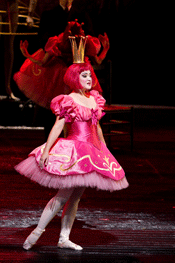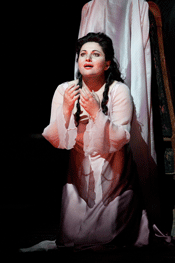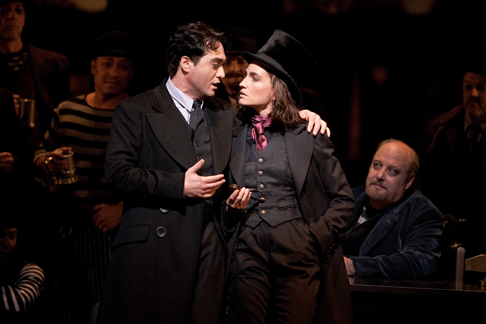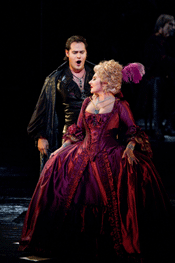28 Oct 2010
Kafka at the Opera: Bartlett Sher’s Production of Hoffmann at the Met
We all come to the opera for different things. To escape, to elevate, to laugh, to cry, or perhaps because someone else bought the tickets.

We all come to the opera for different things. To escape, to elevate, to laugh, to cry, or perhaps because someone else bought the tickets.
But, considering the number of people involved — hundreds of artists and craftsmen onstage and off as well as thousands in the audience at each performance — it is impossible for a production in a large house to fulfill all of the expectations that rise up inside of us the Metropolitan Opera’s signature chandeliers. What is the mark of a good production, especially in a large house? On the one hand, opera involves the energies and resources of many people and, therefore, the hope is that this investment of talent and money will pay off over the course of many seasons despite both rotating casts and changing tastes. However, the thrill of any live performance is its singularity. Part of the allure and, indeed, the satisfaction of seeing an opera (even now in the era of the simulcast) is the ability to stand witness and say “I was there when...” Good directors recognize the challenge of building a show that can stand the test of time but also showcase the particular talents at any given performance.
 Anna Christy as Olympia
Anna Christy as Olympia
In the instance of the Metropolitan Opera’s recent production of
Offenbach’s Les Contes d’Hoffmann (seen here on October
12, 2010), directed by Bartlett Sher, the premiere performances in the winter
of 2009 were disappointing compared to Sher’s invigorated Il Barbiere
di Siviglia (also for the Met) and his stunning Lincoln Center production
of South Pacific. With a few exceptions, the cast seemed to be square
pegs in Sher’s Kafka-shaped holes. Typically compelling performers seemed
unmoored among the shows many disparate cultural allusions. Joseph Calleja, who
stepped into the title role on relatively short notice, and Anna Netrebko (as
both Stella and Antonia) seemed most at sea. Without a surer sense of the
opera’s protagonist and the framing device of his love for the diva
Stella, the opera quickly descended towards pastiche.
 Hibla Gerzmava as Antonia
Hibla Gerzmava as Antonia
A second viewing this season, however, showed Sher’s adaptation in a
much more flattering light. Moments that previously fell flat sparkled and,
while the Kafka parallel still seems arbitrary at times, the interpretive
choices gave a challenging work some new pizzazz. Given the constants of the
production, it is reasonable to conclude that the new energy in his
Hoffmann came from the evening’s individual performances. In the
title role, Giuseppe Filianoti was both sympathetic and impish, showing
heartache through humor in the tradition of Charlie Chaplin. During the tavern
scene at Luther’s, the tenor carried himself with the energy of a man
itching for a fight — even if happens to be with his best friend. The
role is vocally demanding as well as a dramatic challenge and Filianoti sang
with definite style, if not always ease, throughout the entire evening. He and
Hibla Gerzmava made thrilling sounds together and were as appealing visually as
they were aurally. Gerzmava lacked some of the character definition desired for
Stella, but definitely rose to the occasion as Antonia. Thanks in large part to
her gracious singing and acting, Act II could have been performed as a
satisfying dramatic event on its own.
As in the premiere performances, Kate Lindsey epitomized mystique in the dual role of the Muse and Nicklausse. She sings and moves with an energy appropriate for a large house while maintaining a sense of realism in her acting that feels intimate. Occasionally overpowered by the orchestra, Lindsey is a singer with great dramatic and musical finesse. As an actress, the role suits her perfectly and, with the exception of a few vocal distractions, it is easy to slip into believing she is the Muse.
 Giuseppe Filianoti in the title role and Kate Lindsey as Nicklausse
Giuseppe Filianoti in the title role and Kate Lindsey as Nicklausse
Both Elena Mosuc and Enkelejda Shkosa, who sang Olympia and Giulietta, are Met debutantes this season. Of the two, Shkosa made the stronger first impression. As the luscious but avaricious courtesan, she exhibited a wealth of vocal riches as well as a real sense of comedy. Her voice has substance as well as style and her aria was rich and creamy enough to pass as the evening’s dessert. In contrast, Mosuc’s turn as Olympia fell flat. As hard as it must be to play an amusing and engaging automaton, both Kathleen Kim and Rachele Gilmore proved in their performances of this production last year that it can indeed be done.
Ildar Abdrazakov relished the wickedness of the four villains and his performance included several impressive evil laughs. Joel Sorenson performed all four servants with aplomb but his Frantz was particularly notable for being both musically satisfying and genuinely funny.
 Ildar Abdrazakov as Dapertutto and Enkelejda Shkosa as Giuletta
Ildar Abdrazakov as Dapertutto and Enkelejda Shkosa as Giuletta
Of the evening’s debuts, perhaps the most significant was that of
conductor Patrick Fournillier. With only a few exceptions, his tempi moved
briskly enough to keep the action going without becoming frenetic. The chorus
was well-prepared musically by Donald Palumbo, but they were disappointingly
generic for a large group dressed up as circus freaks and students, especially
when compared to the remarkably specific performances Sher evinced from his
actors in South Pacific.
The sets by Michael Yeargan effectively represented a sort of theatre of the mind. Costumes by Catherine Zuber included a few especially titillating supernumeraries and dancers, but also included an awkward ensemble for Antonia’s mother (more than capably sung by Wendy White). Duane Schuler’s lighting did much to evoke mood and smooth over transitions, but it would have been interesting to see both the lighting and minimal projections used to further the reference to Federico Fellini that Sher mentions in his director’s notes. In fact, with his idiosyncratic, fantastic style and his penchant for both autobiographic material and female muses, the Italian director seems a more direct parallel to the character Hoffmann than does the enigmatic outsider Franz Kafka. Even with the newly energized performances, this production of Hoffmann may grow old quickly, especially for those with the ability to see beauty as Kafka described it.
Alison Moritz